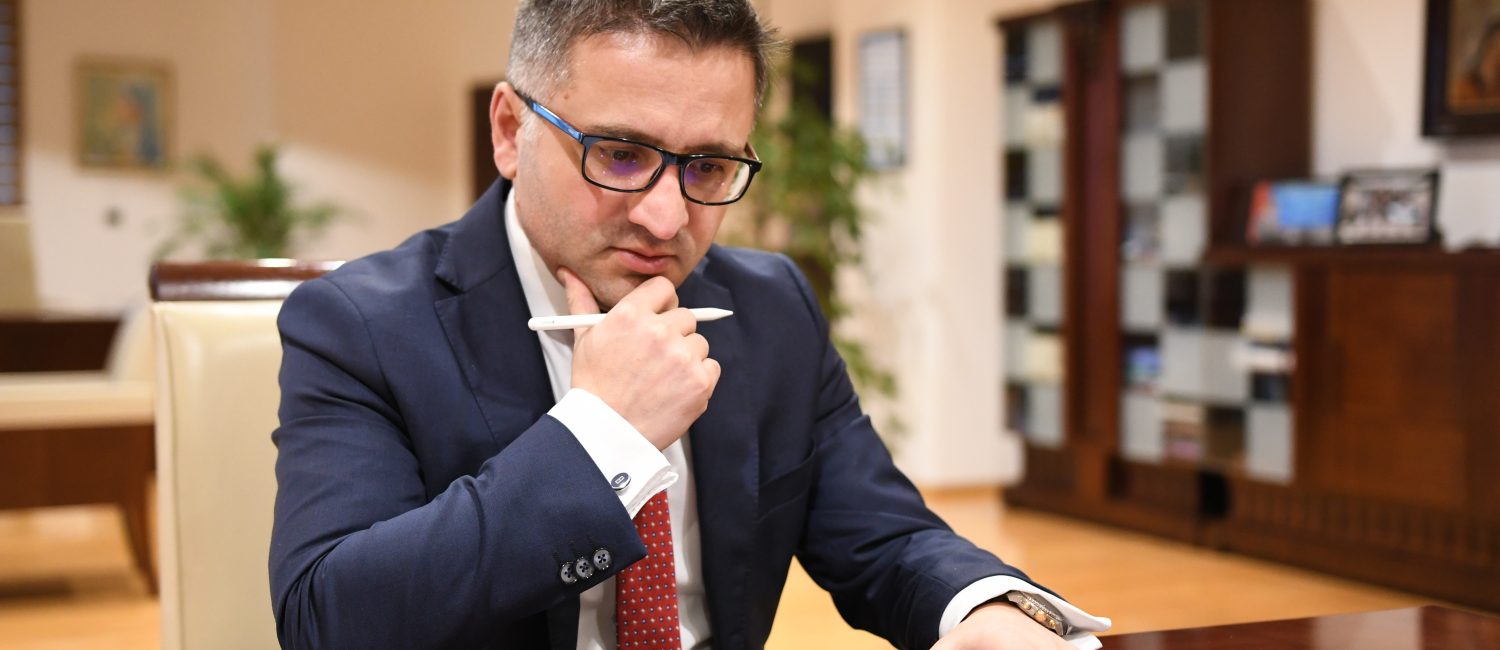22nd January 2023, Skopje – Economic theory says that production specialization provides for greater efficiency and lower production costs. This is the essence of David Ricardo’s theory of comparative advantage, based on benefits from international trade for the countries applying specialized production with the lowest opportunity costs. To comprehend the effects of globalization and supply chains on the prices, it might be the most relevant to go back to the economic basics – the supply and the demand. Globalization means that consumers may less expensive goods from the countries with lower cost labor or technologies for the purpose of improved manufacturing productivity. Greater globalization of trade implies increased supply of goods, and services to a certain degree. The higher the supply the lower the prices, with all other factors being the same.
Over the last 50 years, globalization was driven by cheap capital, low-cost energy and low wages. Now, when interest rates on the international markets are soaring, as are labor costs in Asia, with the invasion on Ukraine rising the prices of energy products, the issue of deglobalization – the basics of international trade and investments as we know them is taking center stage. Some authors argue that recent crises, related to the global supply chains, imply the need for self-sustainability for the purpose of greater resilience of the economies and lower inequality. Driven by the stall amid the pandemic and during the war between Russia and Ukraine, businesses faced a situation in which they had to turn to shortening the supply chains in order to prevent any disruption in the processes, ready to pay more for shorter and safer supply chains.
This past year left a mark on the global economy, equaling the demise of the Bretton Woods System in 1971, the reunification of Germany in 1990 and the global crisis in 2008. For the first time since the 70s, the world is facing imbalance driven by decline in economic growth, coupled by rapid increase of inflation. Increased geoeconomic fragmentation, vulnerability of the financial sector, soaring prices, high debt levels, as well as climate changes, have strong impact, especially on the developing markets. Needless to say that both new models and long-term changes to the systems are required so as to respond effectively to the ongoing developments. Current crises, among other things, also imply systemic drawbacks accumulated over time. Viewing the systems narrowly as sectors, rather than as actual multidisciplinary dynamic entities, especially in the context of the Fourth Industrial Revolution and the climate changes, is also one of the obstacles.
Changing the rules in the current context was addressed at the World Economic Forum Annual Meeting in Davos. During the past week, discussions of policy makers, businesses and civil society were focused on “cooperation in a fragmented world”. As it has been constantly underlined that in order for the economy to get back on the right track and sustainable growth goals to be attained, it is also necessary to continuously strengthen and work on new systems for cooperation. Such developments are to be addressed by establishing new systems in the context of energy and climate; investments, trade and infrastructure; using new generations of technologies for innovations and resilience of the private sector; investing in labour force and skills and new dialogue system and cooperation in the multipolar world.
As the Founder of the World Economic Forum, Klaus Schwab, would say, it is difficult to resolve problems one at a time, since they are all interconnected and a holistic approach is needed to yield good results. As elaborated below in this column, trade and investments are related with the technology, technology is related with the green transition, green transition is related with investments in new skills and labor force, etc.
Managing the Globally High Inflation Rates, Low Economic Growth and High Indebtedness through a New System of Investments and Trade
Facing many crisis for a relatively short period of time, i.e. the COVID-19 induced pandemic, the geopolitical tensions, the disrupted supply chains, the high inflation and the slowed down growth, food and energy crisis, highlighted the tasks we should work more diligently on in future. Moreover, fiscal space is significantly narrowed, with the financial conditions tightened, while the problems with the supply chains and additional protectionist measures impact the global trade agenda. Given the disrupted environment, world leaders in Davos addressed the issues of further cooperation, de-globalization and geo-economic fragmentation, as well as the possibility for re-globalization (new globalization).
Trade and investments are driving force of economic growth, boosting innovations, capital movement and know-how. World Trade Organization (WTO) expects that trade growth will slow down in 2023 as a result of the inflation, the high energy costs, tightening of the monetary policy, shortages of food and fertilizers and rising debt level in the developing countries. The question is how to boost the trade towards building a green and inclusive future.
Leaders of international financial organizations recommend the policy makers and the private sector to be pragmatic and to cooperate, i.e. as IMF Managing Director, Kristalina Georgieva, pointed out, keeping the global economy integrated for the benefit of all of us. World Trade Organization Director-General, Ngozi Okonjo – Iweala, emphasized that the problems cannot to be solved without multilateralism, cooperation and trade. In the modern age, technologies change the physical trade faster than ever, as the artificial intelligence, DLT, 3D printing, smart sensors, etc., bring about greater elasticity of the supply chain, cross border trade, better risk management, and mitigate financial crime. To than end, implementation of the processes of digital identity, improvement of the system’s operability and regulatory environment require enhanced cooperation. Moreover, technology is of exceptional importance for cost reduction and increased trade of services.
In 2020, with the outbreak of the pandemic, foreign direct investments dropped by 35%, showing better performance in 2021. In 2022, global slowdown was registered as a result of the challenges with the commodities and the financial conditions. The need for sustainable investments is also of essential importance, as is the possibility for free movement of foreign direct investments, through multilateral agreements which facilitate the cooperation among the countries. Focus is placed on transparency of the rules and the regulations, coordination among the economies, as well as the innovative instruments as development programs for the suppliers, suppliers’ databases, databases of sustainable investors which will improve both the capacity and the connectivity.
New Systems for Energy and Managing Climate Change amidst Ongoing Energy and Food Crises
Almost half of the world’s population, or approximately 3.3 billion people live in areas highly susceptible to climate change. Costs as regards climate change management, will increase to US$ 340 billion annually by 2030. From several aspects, also including the fiscal one, it is necessary to implement the targets set for reducing the emissions. However, the data demonstrate that the ongoing circumstances do not meet the goals set under the Paris Agreement. Geopolitical shocks, such as the war in Ukraine, contributed to increased use of coal, which production rose by 1.2%, exceeding 8 billion tons per year for the first time since 2013, according to the data from the International Energy Agency. As per most of the analyses, in order to limit the global warming to 1.5°C, greenhouse gas emissions need to be halved by 2030.
Attaining climate change targets , as per the Paris Agreement, requires for both developed and developing economies, to implement policies that will transform the way they produce, spend and invest, which will unquestionably impact the trade. Transitional innovative technologies, efficient measures and low-emission fuels, are required. Cooperation between countries, in particular support for the developing countries, is also necessary. As the President of the European Commission, Ursula von der Leyen pointed out in Davos, “competition and trade are the keys to speeding up cleantech and climate neutrality”.
Energy transformation is closely related to climate change, being predominantly manifested during the past period. Measures related to energy transition are focused on innovative technologies and greater energy efficiency, as well as separating economic growth from energy consumption, primarily in developing countries. Green technology was on the rise during the past decade as well, whereby the continuous improvements thereof provided for making solar and wind energy cheaper. As per certain estimations, by 2050, the transition from fossil fuels to solar and wind energy will provide for saving US$12 trillion on a global scale. Ongoing crisis should be a pretext for sticking to policies underpinning the transition to more sustainable energy sources, and advantage needs to be taken thereof, all to the end of developing more ambitious, comprehensive and sustainable infrastructure investment plans that will contribute to, on a world-wide basis, meeting the goals by 2030.
New technologies can provide for attaining greater productivity and sustainability in the field of agriculture. They can also be exploited in testing the soil quality, the sowing season, the crop health monitoring, the tillage evaluation, as well as in connecting with the new suppliers and purchasers.
Harnessing the Benefits from Development Technologies aimed at Boosting the Private Sector Innovations and Increasing its Resilience
Fourth Industrial Revolution, climate change and geopolitical fragmentation have influenced the private sector’s decisions as regards fresh investments. It is estimated that digital technology will provide for producing around 70% of the new value as regards the global economy. Digitalization penetrates every economic sector, while making each of them adaptable to the newly occurred circumstances. Supporting small businesses to join digitalization can ensure faster and sustainable growth. On the other hand, digital platforms for agricultural products such as Farm Pass are helping millions of farmers from the rural areas, to be provided with access to fair prices, as well as funds, so as to be able to expand their businesses. It is also expected for artificial intelligence to make a significant contribution to plenty of sectors such as manufacturing, agriculture, pharmaceutical industry, health services and care, etc. As for the next period, innovations and adaptability will be the exact factors for ensuring the business sustainability.
Boosting and supporting direct investments in the field of digitalization, such as e-commerce and FinTech, may substantially underpin the economy, to the end of creating new jobs, particularly in post-COVID times.
Investing in Labor Force and Building Skills
Another issue that needs to be covered when setting new economic rules and relations are the labor statistics, displaying that a large number of workers, despite the global economic crisis, are leaving or considering quitting their jobs. Nonetheless, with respect to the developing economies, as a result of the slowed down economic growth, pressures have been exerted, in terms of unemployment and social stability. Hence, considerable investments in the field of education, skills and health care, are crucial amid these conditions, thus responding appropriately to the demand for labor.
New needs, such as green transformation and new technologies entail creating new jobs, while the existing ones are no longer necessary. Employers around the world are more frequently focusing on workers’ skills and knowledge, rather than their degrees and professional background. Hence, investments in the development of certain skills may be highly efficient response to the labor market needs.
Short-Term Expectations
Global leaders and high officials of the international financial institutions gave, last week, more optimistic forecasts for the economy in 2023, while still calling for further vigilance given the challenges still lying ahead. New global growth forecasts will likely be revised upwards, IMF Managing Director, Georgieva pointed out.
Large American Investment Funds also send positive signals since they expect for 2023 to become exceptionally favourable for fresh investments. Upcoming investment cycle will be, as expected, boosted by the innovations.
Challenges are still ahead, such as the geopolitical tensions, the temporary slowdown of the economy of the United States and some of the EU countries, as well as the new quarantines in China. On the other hand, slowed down inflation, and stabilization of both energy prices and corporate profits, are also expected. Certain financial experts expect that 2023 will be, simply put, a “bull market year”, although the initial forecasts by some of the international institutions are more conservative.
On a national scale, despite the multiple simultaneous crises, the international financial institutions estimate that the medium-term trajectory of Macedonian economy has recorded an upward trend. As regards the Western Balkans, Macedonian economy is most open to trade, thus speaking in favor of its readiness to both deal with the competitive pressures and join the globalization flows. Gross investments, as a percentage of Gross Domestic Product, are also at all-time record high level. We remain fully committed to boosting investments in sustainable development areas of prime concern, such as green transition, physical infrastructure, digitalization, human capital and similar, as well as promoting policies and reforms, pertaining to the rule of law and good governance. According to the world-famous management author and consultant Peter Drucker, “The best way to predict the future is to create it.”
















